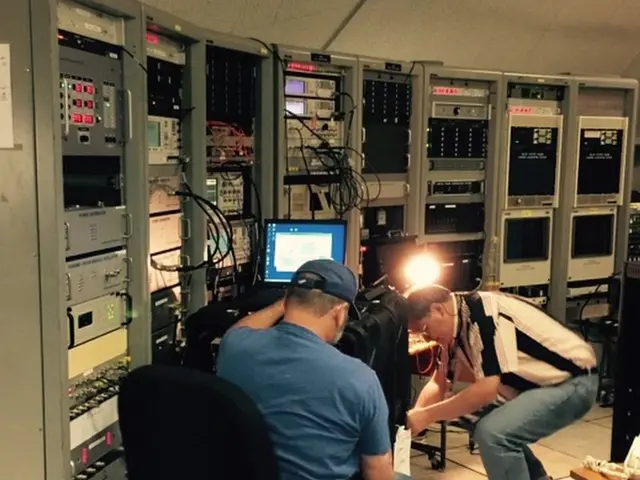LG Chem's Dry Reforming of Methane (DRM) for Carbon Capture and Utilization: An Unconventional Approach to Climate Change
LG and POSCO initiate carbon capture initiative, marked as a significant milestone.
LG Chem, a industry leader, is making strides in carbon capture and utilization (CCU) technologies through its innovative dry reforming of methane (DRM) process. This groundbreaking technology transforms carbon dioxide (CO2) into usable carbon monoxide or hydrogen, which can be utilized as alternative reducing agents in steelmaking or as feedstock for chemical products [1].
Recent Achievements:
- Joint Venture with Posco: LG Chem and Posco Holdings are collaborating to marry DRM technology with emitted gases from Posco's steel mills. The joint goal is to repurpose the captured CO2 into carbon monoxide and hydrogen for ironmaking and clean energy purposes [1]. This collaboration is set to commence next year, with planned full-scale implementation by 2030 [1].
- Operational Growth: LG Chem has successfully operated a 1,000-ton DRM pilot plant in Daesan since 2023, marking significant progress in scaling up this technology [1].
Competition in South Korea:
While the partnership between LG Chem and Posco is a significant move in the CCU sector, South Korea is also focusing on other sustainable energy and carbon emission reduction strategies:- Nuclear Power Expansion: Plans involve prolonging the lifespan of existing nuclear power plants and constructing four new ones to ensure a stable energy supply and decrease dependence on fossil fuels [4].- Green Hydrogen Pioneering: Energy-efficient water electrolysis is gaining traction as a method for green hydrogen production. Recent breakthroughs in electrocatalysts have indicated potential in increasing the efficiency of hydrogen production [5].
Comparative Analysis:
| Technology/Project | Description | Progress/Impact ||-------------------------------------|---|--------------------------|| DRM by LG Chem & Posco | Transforms CO2 into usable carbon monoxide/hydrogen | Joint project set to commence soon, targeting full-scale operation by 2030 [1] || Nuclear Power Expansion | Extends existing nuclear power plants' lifespans and adds new ones | Construction and extension plans currently in place [4] || Green Hydrogen via Electrolysis| Utilizes energy-efficient electrolysis for carbon-free hydrogen production | Advancements in electrocatalysts promising for enhancing hydrogen generation efficiency [5] |
In conclusion, while LG Chem and Posco are paving the way with DRM technology for CCU, other key initiatives in South Korea include nuclear power expansion and the enhancement of green hydrogen production, highlighting a diverse approach to addressing global warming concerns.
- The collaboration between LG Chem and Posco Holdings, a prominent South Korean steel manufacturer, aims to employ DRM technology with emitted gases from Posco's steel mills, with the goal of repurposing captured CO2 into carbon monoxide and hydrogen for ironmaking and clean energy purposes, within setting of international business and economy.
- LG Chem's joint venture with Posco is not the only sustainable energy effort in South Korea; the country is also focusing on nuclear power expansion and green hydrogen pioneering, demonstrating a multifaceted approach towards carbon emission reduction and renewable-energy industry.
- Plans for nuclear power expansion in South Korea involve prolonging the lifespan of existing nuclear power plants and constructing four new ones, with the objectives of ensuring a stable energy supply and decreasing reliance on fossil fuels.
- Energy-efficient water electrolysis is gaining traction as a method for green hydrogen production in South Korea, with recent breakthroughs in electrocatalysts suggesting the potential for increasing the efficiency of hydrogen production.
- LG Chem's DRM project, when fully implemented, will join the commercialization of various technologies in the renewable-energy industry, contributing to a more sustainable global energy sector and economy.
- Chungcheong, a region in South Korea, may witness the ongoing advancements in green hydrogen production and nuclear power expansion, as the government focuses on these ventures to combat climate change and achieve carbon neutrality.
- Finance plays a crucial role in supporting the initiatives outlined above, as investments in the renewable-energy industry, carbon capture and utilization technologies, and low-carbon commercialization can lead to a more sustainable international business and economy, overcoming challenges posed by climate change.







